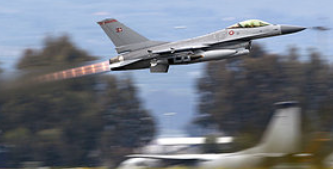NATO Expands Libyan Air Strikes
NATO planners say the allies are stepping up attacks on palaces, headquarters, communications centers and other prominent institutions supporting the Libyan government, a shift of targets that is intended to weaken Col. Muammar el-Qaddafi’s grip on power and frustrate his forces in the field.
Officials in Europe and in Washington said that the strikes were meant to reduce the government’s ability to harm civilians by eliminating, link by link, the command, communications and supply chains required for sustaining military operations.
The broadening of the alliance’s targets comes at a time when the rebels and the government in Libya have been consolidating their positions along more static front lines, raising concerns of a prolonged stalemate. Although it is too soon to assess the results of the shift, a NATO official said on Tuesday that the alliance was watching closely for early signs, like the recent reports of desertions from the Libyan Army.
Strikes on significant bulwarks of Colonel Qaddafi’s power over recent days included bombing his residential compound in the heart of the capital, Tripoli — an array of bunkers that are also home to administrative offices and a military command post — as well as knocking state television briefly off the air.
If the new approach effectively cripples Colonel Qaddafi’s ability to command his military and visibly erodes his legitimacy, NATO strategists say, it may eventually persuade him to flee into exile — or it might prompt someone in his inner circle to force him out.
The strike on Colonel Qaddafi’s palace and command center was denounced by Libyan officials as an assassination attempt, but alliance officers rejected the suggestion. Pentagon officials said the mission was mounted against a legitimate military target, and noted that it was carried out by F-16 jets from Norway — a nation hardly associated with assassination attempts against foreign leaders.
For now, they said, the armed Predator drone aircraft being used in Libya have been flying over rebel-held towns that are under attack or are threatened by loyalist forces — not over the capital.
But officials acknowledged that the alliance is turning to intelligence based on cellular phone and radio intercepts that might indicate which barracks, buildings or compounds are serving as the government’s hidden command posts.
One NATO officials said that from the Libyans’ point of view, “if you know your main headquarters is going to be hit, you get out and set up an alternative in some nondescript barracks.” Attacks on those hidden military command posts are wholly legitimate, officials said — but there is always a chance that Colonel Qaddafi may be inside one of them.
NATO put its new campaign plan in place over the past week or more, but so far the North African climate has not been cooperative. The alliance had intended to step up airstrikes on prominent institutional targets over this past weekend, but the effort was postponed because of bad weather.


